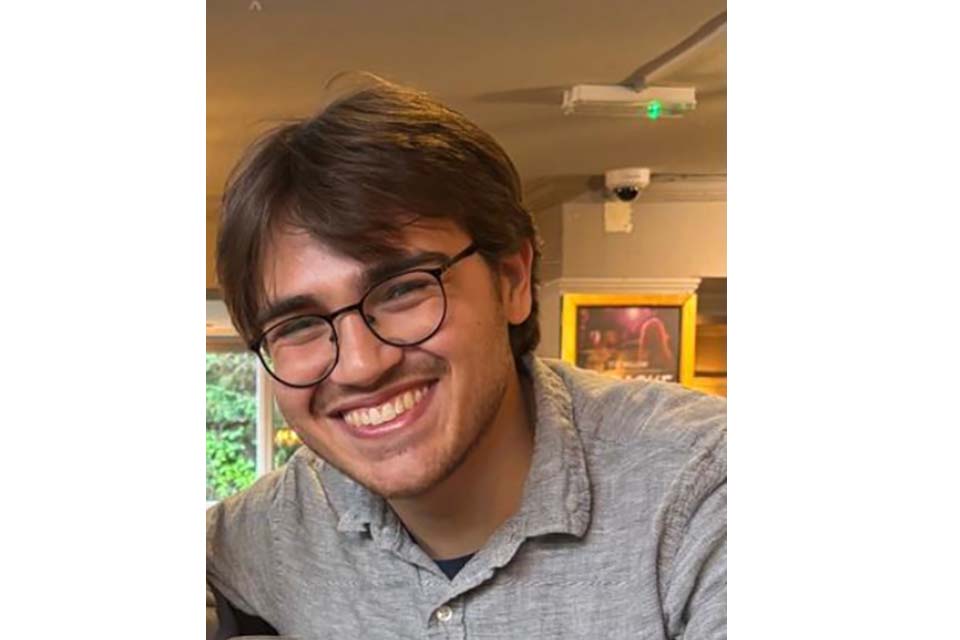An Interconnected Community: An Interview with Physics PhD Student Mason Miguel

September 11, 2025
Abigail Arnold | Graduate School of Arts and Sciences
Physics PhD student Mason Miguel was drawn to Brandeis because of its New England location, cutting-edge research, and small size. “I grew up in Rhode Island and wanted to stay close to family,” he said. He asked his advisor at his undergraduate institution for advice on universities in the area doing interesting research into soft matter physics, and Brandeis was among the suggestions. “I looked into Brandeis and there was a lot of cool research being done, especially considering that Brandeis is relatively small,” he said. “I like small schools a lot more than big schools, so that really drew me in.”
Now beginning his third year, Miguel is a member of Dr. Hannah Yevick’s lab. His research project involves looking into multinucleated cells called syncytia and how their cytoskeleton and adherence to different surfaces changes with respect to size. In the lab, he works to create these cells in a range of sizes, from micron to millimeter scale with the hope to expand further. “I am currently one of three grad students in my lab, so Hannah can dedicate a lot of time to each of us,” he said. “Her door is always open if I want to drop in. Whenever I run into a problem, I can talk to her and resolve it.”
This openness and closeness goes beyond just the student-advisor relationship to the Physics department and Brandeis science graduate community as a whole. “Our physics department is relatively small, and that creates a nice sense of community,” said Miguel. “I’m part of the MRSEC group of several labs, and I know pretty much everyone in all of them and could stroll into them and have a chat. We’ve created a nice hiking community in Physics and other science departments, and we go hiking together in the White Mountains, which is another nice thing about being in New England.” He also receives support and mentorship from faculty outside his own lab. “Jané Kondev, who is my secondary advisor, gives me a lot of useful feedback on my project,” said Miguel. “During my second year, for the advanced exam, he and Guillaume Duclos were on my committee. The exam didn’t feel like a grilling session – it felt more like them giving useful feedback for me to think about for my project. And I can drop into other labs and get advice on anything, whether it’s research or finding jobs and internships. The whole department is really interconnected.”
The Brandeis science community has also helped Miguel connect with a wide range of researchers. He is funded by the Cross-Disciplinary Molecular and Cell Biology grant, which provided travel funding for him to attend a conference at Oxford last year. There he met researchers from across the world. “I got to meet a lot of people outside the Boston bubble, and it was a really great experience that let me widen my network,” he said. The experience was especially valuable in helping him work towards his goal of doing a postdoc in Europe after graduating.
When asked what advice he would give to prospective students in Physics, Miguel recommended prioritizing skill development. “A lot of physics students have a specific subfield they want to work in, but from talking to faculty such as Jané, I know that many people are doing something different as faculty than what they studied in graduate school,” he said. “I think a better way to think of it is to focus on the skills you want to get out of your PhD. As an experimentalist, I learn how to take care of cells, maintain a lab, and do data and image analysis, skills which can be applied to a wide variety of things. You can become a professor or go into analysis for a Fortune 500 company! Physics is a wonderful PhD because it provides you with so many different options.”






